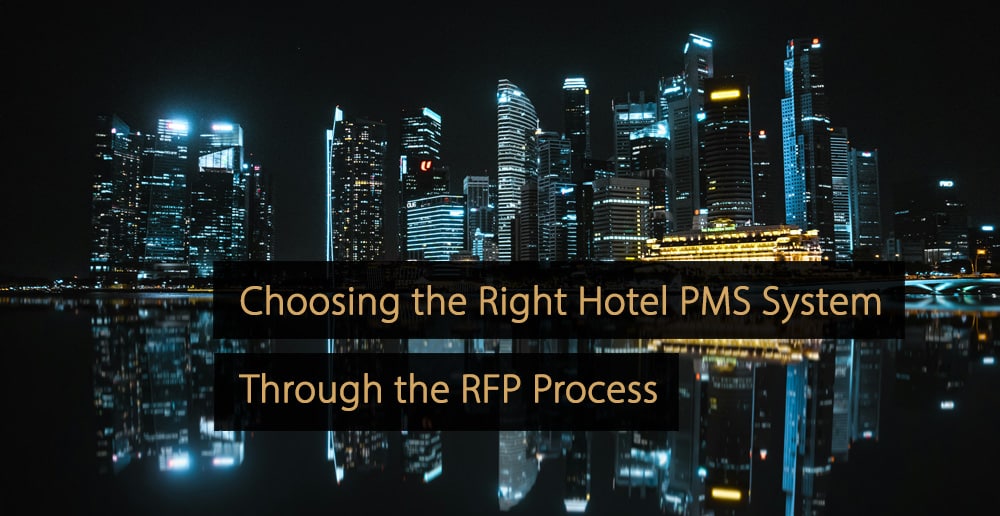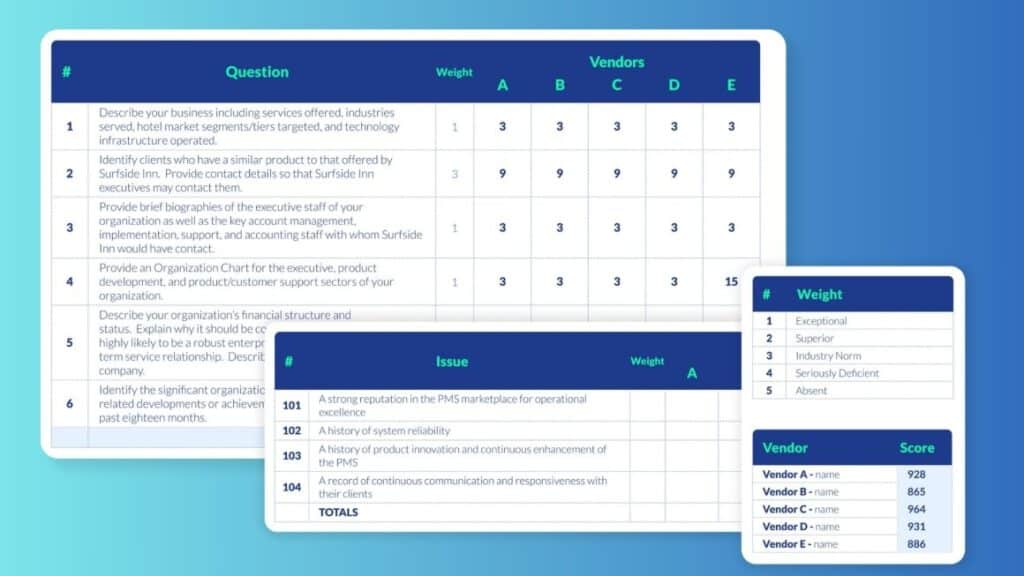When selecting a Property Management System (PMS) for your hotel, the Request for Proposal (RFP) process is crucial for making an informed decision. Through a well-structured RFP, you can ensure a comprehensive evaluation of potential vendors, leading to a successful PMS implementation that aligns with your hotel’s needs. This article explores what an RFP is, its importance, and structure.
What is an RFP?
A Request for Proposal (RFP) is a critical tool for hotels seeking to acquire new products, systems, or services, such as Property Management Systems (PMS). It serves as both a document and a structured process that enables organizations to collect and evaluate information from various vendors. By clearly articulating the hotel’s requirements and expectations, an RFP helps to ensure a comprehensive and fair assessment of potential solutions, particularly when selecting a PMS.
This process not only aids in identifying the most suitable offerings, like a PMS, but also facilitates informed decision-making and negotiation. For hotels embarking on the RFP journey, understanding its purpose and structure is essential for successfully navigating the vendor selection process.
Shiji, a global leader in hospitality technology, has collaborated with hoteliers worldwide to identify the key criteria for creating a successful RFP and everything you need to know to choose the right PMS for your hotel. Download their free RFP Guide and supporting templates for hotel PMS to streamline your selection process.
Why an RFP Is Essential for Choosing the Right Hotel PMS
In the fast-paced world of hospitality, selecting the right Property Management System (PMS) is crucial for enhancing operations, improving guest satisfaction, and staying competitive. As hotels evolve, outdated systems may struggle to keep up with modern demands like cloud-based functionality, seamless integrations, and mobility. A new PMS can offer improved features, greater flexibility, and a better overall user experience, which are essential for the efficient running of hotel operations. To make an informed choice among the many available PMS options, the Request for Proposal (RFP) process serves as an invaluable tool, guiding hoteliers toward selecting the best-fit system for their needs.
Is an RFP a Document or a Process?
It is both. Yes, an RFP is a document—a questionnaire that seeks information about an available product, system, or service. It is also a specifically structured, multi-step information collection and evaluation process.
An RFP solicits information from the issuing organization (such as a hotel or a hotel group) about the details of the product or system, like a PMS or service offered by several competing vendors. It enables that organization to compare not only those vendors’ products but also all the accompanying services—implementation and training, user support, etc.—and their proposed pricing.
Structure of the Ideal RFP
The ideal RFP begins by clearly explaining the issuing company’s business details and the reasons for its interest in securing this type of product, particularly a PMS. It describes the current functionality requirements of the product, system, or service, together with future expectations of it. Once drafted, reviewed, and approved within the organization, the RFP document is ready for distribution to pre-qualified vendors.
Detailing Vendor Responses
The RFP asks each vendor who has received it to describe their product in detail. When that level of detail is provided in the vendors’ responses, the hotel or hotel group can determine the suitability of each proposed product. Through this suitability assessment, the RFP issuer can then identify the products it wishes to examine in greater detail. The detailed RFP response moves the selection, negotiation, and implementation process along in an informed and efficient manner.
Importance of the RFP Document
The RFP document is the central information-gathering tool in the RFP process. It equips the receiving vendors to understand the issuer’s needs, such as those related to a PMS, and to tailor their replies to the many questions that the RFP asks in an accurate and informative manner.
Figure 1: Measuring Elements of an RFP
RFP Formats
A number of RFP formats have emerged—some seeking detailed text-style answers, others streamlined to seeking “Yes/No” answers or “0–5” scores in a spreadsheet. We believe the text-style format to be the most useful since it yields significant information, supporting in-depth analysis of each vendor’s product. This format also enables an effective comparison of the features and functions, the supporting services, and the proposed pricing.
Standard RFP Structure
The structure of the RFP questionnaire is relatively standard. It is explained, and examples of an introduction of the issuer, the explanation of the requirement, and sample questions are provided in the RFP Kit you can download.
Choosing the right PMS is crucial for your hotel’s success. An RFP provides clarity, customization, and thorough vendor evaluation. Use the Guide and Templates to create an effective RFP, helping you select a system that meets your hotel’s goals.
Free Guide: Choosing the Right Hotel PMS System through the RFP Process
The RFP Guide and Templates for Hotel PMS provide a comprehensive framework for hotels selecting the right Property Management System. You’ll learn how to structure a Request for Proposal (RFP) that ensures a detailed evaluation of potential PMS vendors.
Click here to download the guide “Choosing the Right Hotel PMS System through the RFP Process“.
More Tips to Grow Your Business
Revfine.com is the leading knowledge platform for the hospitality and travel industry. Professionals use our insights, strategies, and actionable tips to get inspired, optimize revenue, innovate processes, and improve customer experience.Explore expert advice on management, marketing, revenue management, operations, software, and technology in our dedicated Hotel, Hospitality, and Travel & Tourism categories.









Leave A Comment